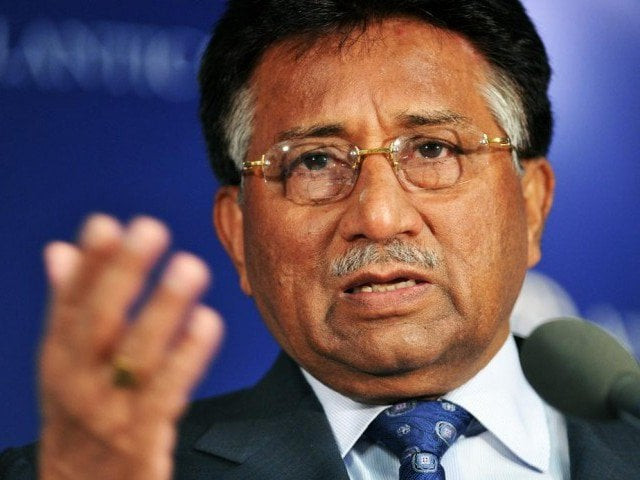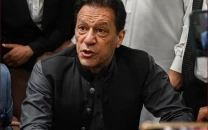Musharraf treason case: Special court to resume hearing on March 8
Chief Commissioner, IGP, AIG Islamabad instructed to arrange 'fool proof security' for former dictator

Former President General [retd] Pervez Musharraf. PHOTO: AFP
A three-member bench, headed by Peshawar High Court Chief (PHC) Chief Justice Yahya Afridi, will resume hearing of the case on March 8. Other members of the bench are Lahore High Court (LHC) CJ Yawar Ali and Justice Tahira Safdar of the Balochistan High Court (BHC).
The case pertains to the imposition of extra-constitutional emergency in the country in 2007. Akram Sheikh is appearing as prosecutor in the case.
A member of the prosecution team told The Express Tribune that the special court should decide the treason case expeditiously in view of the Supreme Court’s February 26, 2016 order.
Pakistan’s defence is strong, Musharraf tells India
Legal experts call the case – pending since 2013 – a big test for superior judiciary. Ruling party leaders were also voicing concerns over why the courts were why the courts are not taking cognisance of the case, arguing that treason is a graver offence than others, including corruption.
The expectations grew stronger after the apex court ordered the federal government to take steps to bring back former Pakistani ambassador Hussain Haqqani from the US.
The special court, meanwhile, issued a notification directing the chief commissioner, the inspector general and the additional inspector general of police in Islamabad to make ‘foolproof security arrangements’ for Gen (retd) Pervez Musharraf.
The former military dictator was indicted in March 2014 after he made an appearance before the court, rejecting all charges against him in front of the three-member special bench.
The charges read out to Musharraf were the same that were slapped by the government in 2013 at the time of the formation of special bench – subverting and circumventing the Constitution by imposing emergency on November 3, 2007.
On March 18, 2016, the former president flew to Dubai for medical treatment shortly after his name was removed from the exit control list (ECL) on Supreme Court’s directives.
Musharraf called Ganguly and said no 'adventures', reminisces Indian legend
On May 11, 2016, a three-judge bench, headed by former PHC CJ Mazhar Alam Khan Miankhel, declared former president Musharraf a proclaimed offender (PO) in the high treason case. The special court had directed the interior ministry and the Federal Investigation Agency (FIA) to advertise the court verdict about the confiscation of his property.
A year later, a special court restrained Musharraf’s counsel from presenting his arguments, noting that it could not hear the lawyer of an absconder.
In May 2017, Musharraf had expressed, through a plea, his willingness to face the high treason trial under the army’s protection, and on the assurance from the court that he would be given a safe passage to return to Dubai.
In April last year, the federal government requested the special court to proceed with the trial of former military ruler Pervez Musharraf in the high treason case, which was initiated against him for abrogating the Constitution in November 3, 2007.
“Under Section 9 of the Criminal Law Amendment (Special Court) Act, 1976, this Hon’ble Court (Special Court) is required to proceed with the trial and not grant any adjournment for any purpose unless it is of opinion that the adjournment is necessary in the interest of justice,” says the prosecution team that submitted written synopsis regarding the completion of the trial.
The special court had asked the prosecution team to submit written synopsis regarding the trial completion.
“The Special Court may in the interest of preserving both the fundamental and special law of the land and to comply with the order of the Apex Court and to thwart repeated efforts of the accused to impede justice, kindly proceed with the trial after taking whatever steps deemed necessary for the purpose,” states Akram Sheikh in written submission.
Sheikh also claims that it is evident from both the record and behavior of the accused that the accused is not ill and that furthermore his absence has been brought about by himself to impede the course of justice.
Giving the case history, the prosecution team states that Musharraf in this trial has, from time to time on one pretext or the other, been seeking adjournments and has finally stopped appearing in this matter so as to impede the course of justice. The prosecution closed its evidence on 18.09.2014 after the accused had availed full opportunity to cross-examine the witnesses.
On 10.09.2014, before the close of evidence, the accused, instead of presenting his defence, submitted a statement in which he sought to assuage his guilt by seeking to implicate other persons for aiding and abetting him, according to the prosecution head.
He goes on to state that on 21.11.2014, the special court ordered rejoinder of three co-accused persons and in this respect directed the federal government to submit additional statement as well as formal charges. The said order was, however, set aside by the apex court on February 26, 2016. The SC in that order had directed the court to proceed with the trial of the accused without any unnecessary delay.
On March 8, 2016, the special court issued notice to the accused to appear in person for examination, however, without permission from this court the accused travelled abroad purportedly for medical reasons. Subsequently, the accused was declared by this court as a proclaimed offender and absconder, and attachment proceedings were directed against his properties under Section 88 Cr PC, says the prosecution head.
I am the 'greatest supporter of LeT', says Musharraf
On March 5, 2014, Musharraf filed a CMA before the special court, wherein a request to travel aboard was made, he states, adding that he had assured the court that he would continue to contest the case and that he would be back whenever required by this court.
It is further stated that Musharraf has consistently held throughout the course of this trial, as well as in the latest objection application submitted on January 16 that he will return to the country to face the trial as soon as his medical treatment is completed.
“Under Section 9 of the Criminal Law Amendment (Special Court) Act, 1976, this Hon’ble Court is required to proceed with the trial and not grant any adjournment for any purpose unless it is of opinion that the adjournment is necessary in the interest of justice”, says the prosecution team’s head.
“No trial before the Special Court shall be adjourned for any purpose unless the Special Court is of opinion that the adjournment is necessary in the interest of justice and, in particular, no trial shall be adjourned by reason of the absence of any accused person due to illness, or if the absence of the accused or his counsel has been brought about by the accused person himself, or if the behaviour of the accused person prior to such absence has been, in the opinion of the Special Court, such as to impede the course of justice but, in any such case, the Special Court shall proceed with the trial after taking necessary steps to appoint an advocate to defend any such accused person,” writes Sheikh, citing section 9.



















COMMENTS
Comments are moderated and generally will be posted if they are on-topic and not abusive.
For more information, please see our Comments FAQ